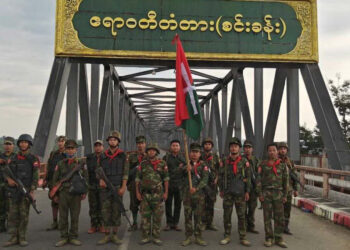NAYPYITAW — Military representatives to Myanmar’s Parliament discussed in favor of signing the United Nations Treaty on the Prohibition of Nuclear Weapons (TPNW) during the parliamentary session on Friday.
As lawmakers debated President U Win Myint’s proposal to sign the TPNW, military representative to the Lower House Lieutenant-Colonel Zaw Tun Oo said the signing would clear up the doubts as to whether Myanmar is developing nuclear weapons.
Myanmar attracted global concern in the 2000s when the country’s then military rulers maintained close relations with North Korea regarding arms sales, nuclear missile development and nuclear warhead technology.
The Washington-based Nuclear Threat Initiative said Myanmar had developed relations with North Korea in the hope of receiving missile and nuclear weapon technologies.
“If we sign the agreement, this will clear up the past accusations against our country and the Tatmadaw. Besides, this will also contribute to our country being able to use nuclear energy peacefully. So, I’d like to urge [the Parliament] to weigh the national interests,” said the lieutenant-colonel.
Myanmar is sandwiched between two big nuclear-armed states, and in case of a nuclear threat, it can seek help from the international community after signing the treaty, he said.
Myanmar’s Tatmadaw wants to have nuclear technologies, not to produce weapons of mass destruction but to use in the medical, science, technology, and energy sectors according to international norms, said the military representative.
Lawmakers also discussed in favor signing the treaty, saying that it would boost the country’s image.
“By signing the treaty, Myanmar will be recognized by international countries as a responsible country,” said Dr. San Maung Maung, Upper House lawmaker from Bago Region.
The treaty is not yet in force but will enter into force with ratification by more countries, said Union minister for International Cooperation U Kyaw Tin.
The treaty includes a comprehensive set of prohibitions on participating in any nuclear weapon activities. These include undertakings not to develop, test, produce, acquire, possess, stockpile, use or threaten to use nuclear weapons.
The Union Parliament approved signing the treaty, and the Myanmar delegation will sign it at the ceremony to ratify international treaties from September 26-28 during the 73rd United Nations General Assembly in New York, said the minister.
Though the treaty will not lead to the total elimination of nuclear weapons, it allows non-nuclear weapon states to put political pressure on countries with nuclear weapons, said U Kyaw Tin.
The treaty obliges State parties to provide adequate assistance to individuals affected by the use or testing of nuclear weapons, as well as to take necessary and appropriate measures of environmental remediation in areas under its jurisdiction or control contaminated as a result of activities related to the testing or use of nuclear weapons.
The treaty was adopted in July 2017 during the UN General Assembly. Through August 23, 2018, 60 countries ratified it and 14 countries were approved.
Myanmar signed the Treaty on Non-Proliferation of Nuclear Weapons in 2012, Biological Weapons Convention in 2014, Chemical Weapons Convention in 2015, and Comprehensive Nuclear-Test-Ban Treaty in 2016.
Translated from Burmese by Thet Ko Ko.

















